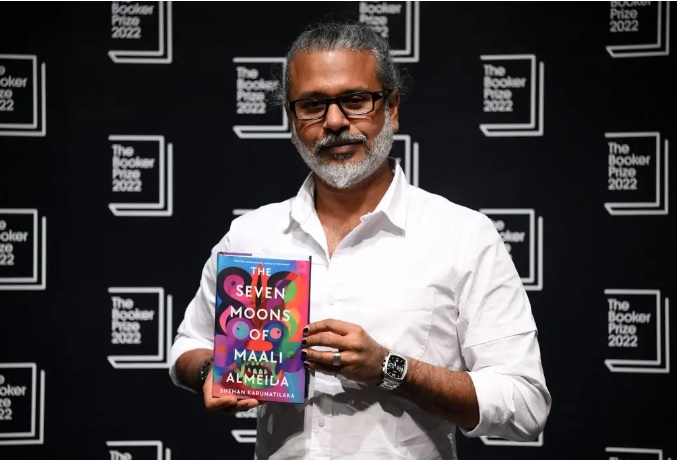LONDON: The Seven Moons of Maali Almeida by Sri Lankan author Shehan Karunatilaka has won the Booker Prize for fiction, one of the world’s most prestigious literary awards. The judges praised the “ambition of its scope, and the hilarious audacity of its narrative techniques”.
Karunatilaka’s second novel, The Seven Moons of Maali Almeida comes more than a decade after his debut, Chinaman: The Legend of Pradeep Mathew, which was published in 2011. As a boy living through Sri Lanka’s civil war in the 1980s, Karunatilaka thought of political violence as part of the landscape. War was a constant backdrop to daily life, more mundane than frightening at times. So when he had the idea for a novel about a Sri Lankan war photographer who wakes up dead, in an underworld populated with victims of political violence, he conjured up what felt like the most realistic version of the afterlife: a tedious, dysfunctional bureaucracy, where hordes of confused ghosts are waiting to be processed.
The Booker-winning novel tells the story of the photographer of its title, who in 1989 wakes up dead in what seems like a celestial visa office. With no idea who killed him, Maali, a gambler, an atheist and a closeted gay man, sets out to solve the mystery of his own murder. Written in the second person, the supernatural satire unfolds in Colombo with Maali Almeida waking up dead, without a clue as to how or why he was killed. However, he figures he’s been targeted for his explosive photographs. Almeida tries to navigate the afterlife, and is told he has “seven moons” to learn who killed him and to uncover his cache of photos. Along the way, he encounters maimed and mutilated victims of sectarian violence.
Neil MacGregor, chair of the judges for this year’s prize, said the novel was chosen because “it’s a book that takes the reader on a rollercoaster journey through life and death right to what the author describes as the dark heart of the world”.
“And there the reader finds, to their surprise, joy, tenderness, love and loyalty,”
“We admired enormously the ambition and the scope and the skill, the daring, the audacity and the hilarity of the execution,” MacGregor, the former director of the British Museum said during a news conference. “
MacGregor was joined on the judging panel by academic and broadcaster Shahidha Bari; historian Helen Castor; novelist and critic M John Harrison; and novelist, poet and professor Alain Mabanckou. The judges were unanimous in their decision to award the prize to Karunatilaka, according to the chair.
Upon winning the award, Karunatilaka said, “My hope for [Seven Moons] is this: that in the not-too-distant future, it is read in a Sri Lanka that has understood that the ideas of corruption and race-baiting and cronyism have not worked and will never work. I hope it’s read in a Sri Lanka that learns from its stories and that this book will be in the fantasy section of a bookshop and will not be mistaken for realism or political satire.”
The Booker Prize is awarded annually to a book published in English in the United Kingdom or Ireland. It is known to revolutionalise the careers of winners, with Salman Rushdie, Arundhati Roy, Margaret Atwood and the late Hilary Mantel among many who became household names after their award. The International Booker Prize — its 2022 edition won by Geetanjali Shree for her Hindi novel, Tomb of Sand, the first Indian-language work to win the prize — is awarded to a work of translation published in the same territories.
Karunatilaka addressed the people of Sri Lanka in Tamil and Sinhalese. He summarised what he said in English: “I write these books for you… Let’s keep sharing these stories.”
He later added that he had “self-censored” a couple of short stories after author Salman Rushdie was stabbed in August, having faced years of death threats for his novel The Satanic Verses, which some Muslims see as blasphemous.
“I was in the process of publishing a collection of short stories when this incident happened, and I discovered a couple which I don’t think was offensive to any religion,” Karunatilaka said.
“But my wife said, can you not do that? You’ve got two young kids. This story is not that good. Just leave it out.”
He added that “this is something that hangs over all of us if we’re writing in South Asia, especially writing about politics or religion”.
This year the original 1969 Booker prize trophy was reinstated in memory of its creator, the children’s author and illustrator Jan Pieńkowski, who died in February.
The trophy was presented to Karunatilaka by Camilla, the Queen Consort, in one of her first official public engagements since she took on her new role, at a ceremony hosted by comedian Sophie Duker at the Roundhouse in London. Last year’s winner Damon Galgut presented Karunatilaka with his prize money of £50,000.
The Seven Moons of Maali Almeida is published by the independent press Sort of Books. This year is the first time a book by the publisher has been longlisted for the prize.
In his Guardian review, Tomiwa Owolade said the book’s “scenarios are often absurd … but executed with a humour and pathos that ground the reader”. He added: “Karunatilaka has done artistic justice to a terrible period in his country’s history.”

The Booker, which comes with a cash prize of £50,000, or roughly $57,000, is awarded annually to the best novel written in English and published in Britain or Ireland. Past winners include literary giants like V.S. Naipaul, Kazuo Ishiguro, Salman Rushdie, Margaret Atwood, Ian McEwan and Hilary Mantel, and the prize has launched the careers of debut novelists like Douglas Stuart, Arundhati Roy and Aravind Adiga.
Karunatilaka was born in Galle in 1975, and grew up in Colombo. He studied in New Zealand, and went on to work and live in London, Amsterdam and Singapore. He has over 20 years of experience working for ad agencies, tech firms, media houses, start-ups and multinationals across Singapore, London, Colombo, Sydney and Amsterdam. He has worked as an advertising copywriter, and played guitar in an alternative rock band, Independent Square. The author has also written rock songs and screenplays. He currently lives in Colombo, where he still writes ad copy during the day and works on his fiction in the early morning.
In addition to his widely-acclaimed books, the author has also written features on sport, music and travel for The Guardian, Rolling Stone, Wisden, GQ, Conde Nast and National Geographic.
In an interview, a few weeks prior to the Booker awards ceremony, Karunatilaka listed his five favourite Booker-winning or Booker-shortlisted novels: Lincoln in the Bardo, Cloud Atlas, The Handmaid’s Tale, Girl and Woman.
He first had the idea for the novel that became “The Seven Moons of Maali Almeida” in 2009. It was in the immediate aftermath of the civil war, as Sri Lanka was undergoing a national reckoning over the causes of the conflict and the unfathomable number of civilian casualties. Karunatilaka wondered what processing the lingering trauma of war would feel like if the dead could speak, and decided to write “a ghost story where the dead could offer their perspective” after the end of the Sri Lankan civil war, “when there was a raging debate over how many civilians died and whose fault it was”.
Though he was hesitant to write about the war, he started working on it years later, around 2014. For a long time, he struggled with the tone. He eventually cracked the narrative open as a dark comedy when he imagined the afterlife as a bland bureaucracy: “The afterlife is a tax office and everyone wants their rebate,” he writes.
“Maybe that is a plausible explanation for why Sri Lanka seems to go from tragedy to tragedy, that there are all these restless spirits and ghosts wandering around, confused, not sure what they’re supposed to do, and they amuse themselves by whispering bad ideas into people’s ears,” Karunatilaka said in a video posted on the Booker website. “I thought, this is a useful way of exploring this grim subject matter, but having a bit of lightness and a bit of playfulness also.”
“The Seven Moons of Maali Almeida” was one of several political satires recognized by the Booker judges this year. The six finalists also included the Zimbabwean writer NoViolet Bulawayo’s novel “Glory,” a parable about an African dictator that features a cast of talking animals, and “The Trees,” Percival Everett’s blistering and darkly funny novel about a pair of Black detectives who investigate a series of murders that echo the lynching of Emmett Till.
The judges, who were unanimous in choosing “The Seven Moons of Maali Almeida,” were won over by “the variety of registers it was deploying, the skill with which language was used, and the confidence with which it shifted genre,” from noir to philosophical reflections to comedy, MacGregor said.
MacGregor said that although all six books on the shortlist were very different, “it became clear … that they were all really about one question, and that is ‘what’s the importance of an individual life?’”
Bea Carvalho, head of fiction at Waterstones, said she and her colleagues were “thrilled” that Karunatilaka’s “fiercely inventive novel” had won.
She described The Seven Moons of Maali Almeida as “a triumphant, epic feat of imagination and wisdom which dissects a dark period of our recent history with satire and panache”.
Filmed extracts from the shortlisted books, directed by Kevin Thomas and starring Nikki Amuka-Bird, Jarvis Cocker, Anna Friel, David Harewood, Sharon Horgan and Prasanna Puwanarajah, were shown during the ceremony.
Singer-songwriter Dua Lipa delivered a keynote speech on how her love of reading helped her connect with her family and identity. She said early obsessions included Roald Dahl and Malorie Blackman, “both of whom gave me little pearls of wisdom that still guide me today”.
Earlier this year, the singer launched a podcast called At Your Service, with guests including Hanya Yanagihara and Min Jin Lee. She said speaking one-to-one with some of her favourite authors was “honestly better than any therapy session I’ve ever been to”.
The ceremony was broadcast as part of a 45-minute Front Row special on BBC Radio 4, where presenter Samira Ahmed interviewed British-Turkish author Elif Shafak about what the attack on Salman Rushdie’s life means for writers around the world. The ceremony also paid tribute to double-Booker winner Hilary Mantel, who died in September.
(Content/Picture Credits: The Guardian, New York Times and agencies)



